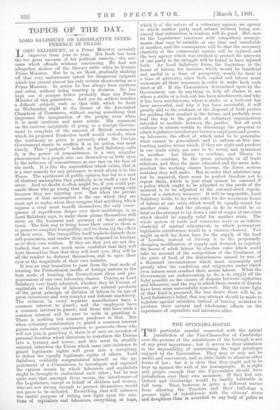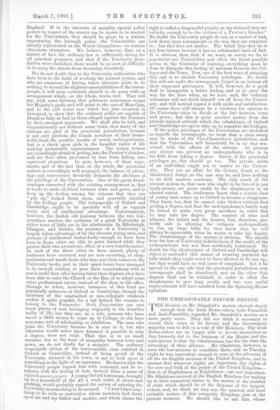THE SPINNING-HOUSE. England. If in the interests of morality, special
police powers in respect of the streets can be shown to be wanted for the Universities, they should be given by a statute empowering the borough police—the Universities are already represented on the Watch Committees—to remove obnoxious characters. We believe, however, that, as a matter of fact, the ordinary law is sufficiently strong for all practical purposes, and that if the University juris- diction were abolished, there would be no sort of difficulty in keeping the streets from becoming disorderly.
We do not doubt that to the University authorities who have been in the habit of working the present system, and who are conscious of having taken immense pains to do nothing to wound the slightest susceptibilities of the towns- people, it will seem extremely absurd to do away with an arrangement which, on the whole, works well. They will say, with some fairness, that prisoners sometimes escape her Majesty's gaols, and will point to the case of Miss Cass, and to the still worse case which has just occurred in Liverpool, to show that the ordinary police are capable of blunders fully as bad as those alleged against the Proctors by their strongest opponents. We shall also be told, and unquestionably not without some truth, that many of the citizens are glad of the proctorial jurisdiction, because it not only protects the female members of their house- holds from the possible insults of rowdy undergraduate. s, but is a check upon girls in the humbler ranks of life making undesirable acquaintances. The young women are exceedingly afraid of getting into the Proctor's clutches, and are thus often prevented by fear from falling into equivocal situations. In spite, however, of these argu- ments, and of the fact that, on the whole, the proctorial system is exceedingly well managed, the balance of advan- tage and convenience decidedly demands the abolition of the privilege of the Universities. One of the great disad- vantages connected with the existing arrangement is, that it tends to make ill-blood between town and gown, and to keep up the feeling among the citizens that they are " put on," looked down upon, and generally insulted by the College people. The townspeople of Oxford and Cambridge ought to be specially well off as regards every sort of intellectual advantage. Unfortunately, however, the foolish old jealousy between the two Cor- porations renders the existence of a great University in either town of little use to the inhabitants. In Edinburgh, Glasgow, and Dublin, the presence of a University is largely taken advantage of by the cleverer young men, and persons of intellectual tastes.lucky enough to have been born in those cities are able to grow learned while they pursue their own avocations, often of a very humble nature. In each of the three cities we have named, plenty of instances have occurred, and are now occurring, of shop. assistants and small clerks who have put their names on the University books, and in their spare hours have managed to do enough reading to pass their examinations with so much credit that, after having taken their degrees, they have been able to enter the Church or the Bar, or to adopt some other professional career, instead of the shop or the office. Strange to relate, however, instances of this kind are practically unknown at Oxford or Cambridge, though the existence of the unattached or non-collegiate students makes it quite possible for a lad behind the counter to belong to the University. Both Universities can now boast plenty of men belonging originally to the humbler walks of life, but they are, as a rule, persons who have saved a` little money to come up to College, or else have won some sort of scholarship or exhibition. The man who joins the University because he is near to it, but who otherwise would never have dreamed it possible to take a degree, does not exist. That this is in no small measure due to the want of sympathy between town and gown, we do not doubt for a moment. The ordinary respectable citizen of the lower-middle class resident in Oxford or Cambridge, instead of being proud of the University situated in his town, is apt to look upon it something in the light of an oppressor. He fancies that the University people regard him with contempt, and he re- taliates with the feeling of hate derived from a sense of injured amour-propre. A young Oxford townsman, brought up in a household of the £3 a week order, if clever and pushing, would probably regard the notion of entering the University as something to be scorned. " I won't have any- thing to do with an institution whose members look down upon me and my father and mother, and which claims the right to inflict a disgraceful penalty on my sisters if they are unlucky enough to be the victims of a Proctor's. blunder." No doubt the University people do not, as a matter of fact, look down upon townspeople in the way they are supposed to ; but this does not matter. The belief that they do is not less intense because it has no substantial basis of fact. It is obvious, then, that if we want, as surely we do, to popularise our Universities and allow the freest possible access to the fountains of learning, everything must be done to dissipate this feeling of soreness between the Col- leges and the Town. Now, one of the best ways of attaining this end is to abolish University privileges. No doubt this will not make the townspeople forget in an instant all their supposed grievances. It will, however, do a good deal to inaugurate a better feeling, and so to pave the way for the time when, as we have said, the ordinary townsman will not think himself cut off from the Univer- sity, and will instead regard it with pride and satisfaction. Of course there will always be a tendency for opinion in the University cities to divide at the line between town and gown ; but this is quite another matter from the present injured attitude which the inhabitants of Oxford and Cambridge are apt to take up in regard to the Colleges. If the police privileges of the Universities are abolished as regards the townspeople, we trust that a clean sweep may be made of the Vice-Chancellor's jurisdiction, and that the Universities will henceforth be in no way con- cerned with the affairs of the citizens. At present any citizen can prevent an undergraduate who is in his debt from taking a degree. Surely, if the proctorial privileges go, this should go too. The private debts of an individual ought not to matter to the Univer- sity. They are an affair for the County Court or the Bankruptcy Judge, as the case may be, and have nothing to do with matters academic. The only result of the present system is, that men who ought to be forced to pay ready-money, are given credit by the shopkeepers to an absurd extent. The tradesmen know that a certain class of young man comes up to Oxford to become a clergyman. They know, too, that he cannot take Orders without first getting a degree, and that the undergraduate's family may be forced to make very great sacrifices in order that he may take his degree. The vendors of wine and tobacco, the tailors and the hosiers, feel, therefore, per- fectly safe in allowing the ordinary undergraduate to run up large bills, for they know that he will always be squeezable when he wants to take his degree. The disadvantage of the system is obvious. Wo should hear far less of University indebtedness if the credit of the undergraduate was not thus artificially buttressed. No doubt the big shopkeepers of Oxford and Cambridge will object to surrender this means of securing payment for bills which they ought never to have allowed to be run up ; but they would have no real cause of complaint. Let it be agreed on the one side that the proctorial jurisdiction over townspeople shall be abandoned, and on the other that degrees shall not be withheld in order to allow the shopkeepers to give long credit, and two very useful improvements will have resulted from the Spinning-House agitation.







































 Previous page
Previous page